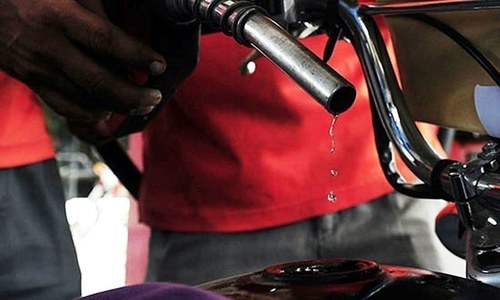ISLAMABAD: The government on Sunday reduced prices of all petroleum products except High Speed Diesel (HSD) to partially pass on the impact of massive international price reduction to the masses. The revised prices will remain effective till June 30.
In doing so, the government increased the rate of petroleum levy on petrol by more than 26pc to mop up additional windfall revenues of about Rs6.5bn. The levy on petrol was increased from Rs23.76 per litre to the maximum permissible limit of Rs30 per litre.
The decision was announced by the ministry of finance, after consultations with representatives of the International Monetary Fund, in a balancing act to share the drastic fall in international oil prices among consumers already hit badly by Coronavirus lockdown.
Under the announcement, the ex-depot price of petrol was fixed at Rs74.52 per litre from Rs81.58 per litre at present, showing a reduction of Rs7.06 or 8.65pc. Based on the existing tax rates and the PSO’s import cost, the petrol price should have come down by Rs13.30 per litre but the government decided to revise petroleum levy by Rs6.24 per litre. As such, the share of GST and petroleum levy now works out at about Rs40.45 per litre. The product is mostly used in private transport, small vehicles and two-wheelers.
Rate of levy, however, increased by 26pc
On the other hand, the ex-depot price of high speed diesel was set at Rs80.15 per litre, up by a nominal 0.05 paisa per litre, from its existing rate of Rs80.10. The total amount of tax and levy now stands at about Rs41.65 per liter, more than double the actual cost of diesel. The HSD is mostly used in heavy transport vehicles and agricultural engines like trucks, buses, tractors, tube-wells and threshers etc.
The government fixed the ex-depot price of kerosene oil at Rs35.56 per liter for June instead of Rs47.44 per liter at present, down Rs11.88 per liter (25pc).
Also, the ex-depot price of Light Diesel Oil (LDO) has been fixed at Rs38.14 per liter instead of Rs47.51 per liter at present, showing a reduction of Rs9.37 per liter or about 20pc. The LDO is mostly used in flour mills and a couple of power plants.
Benchmark Brent crude prices have plunged since February by a massive 80pc to $16 a barrel in May. This is the steepest fall in oil prices in recent history.
An official said the finance ministry wanted to make up for revenue losses arising out of lower import parity price for crude and petroleum products and lower consumption due to the lockdown and the overall revenue shortfall it had faced in the first 11 months of the current fiscal year.
The government has already increased the general sales tax (GST) on all petroleum products to a standard rate of 17pc across the board to generate additional revenues. Until January last year, the government was charging 0.5pc GST on light diesel oil (LDO), 2pc on kerosene, 8pc on petrol and 13pc on HSD.
Besides the 17pc GST, the government has almost quadrupled the rate of petroleum levy on HSD and petrol to Rs30 per liter from Rs8 per liter in January last year.
The levy on kerosene and light diesel oil was also increased last month to Rs18 and Rs11.28 per liter last month from Rs6 and Rs3 per liter respectively.
Over the last many months, the government had been increasing petroleum levy rates to partially recoup a major revenue shortfall faced by the FBR. The levy remains in the federal kitty unlike GST that goes to the divisible pool taxes and thus about 57pc cent share is grabbed by the provinces.
The petrol and HSD are two major products that generate most of revenue for the government because of their massive and yet growing consumption in the country.
Average petrol sales are touching 700,000 tonnes per month against the monthly consumption of around 600,000 tonnes of diesel. However, the sales of petrol have dropped in recent weeks due to the lockdown. The diesel consumption had also dropped after the lockdown but has since picked up owing to wheat harvest. The sales of kerosene oil and LDO are generally less than 11,000 and 2000 tonnes per month.
Published in Dawn, June 1st, 2020















































